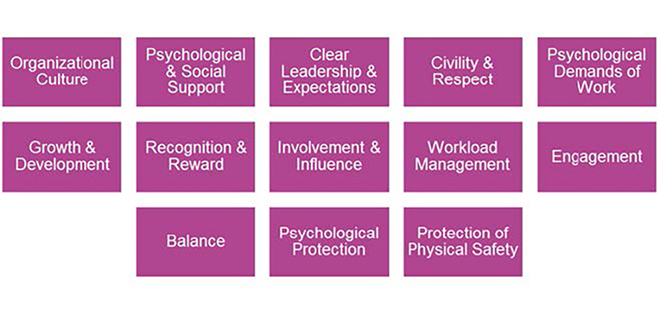 Psychological Health and Safety in the Workplace
Psychological Health and Safety in the Workplace

Joint BCNU and UBC Psychological Health Survey
The University of British Columbia conducted a confidential online psychological health survey in collaboration with the BC Nurses' Union from June 17 - July 22, 2020. It followed a similar survey that was initiated in the fall of 2019. The nurse researchers asked that members share their experience around anxiety, burnout, depression, and exposure to violence during COVID-19.
COVID-19 has changed the workplace landscape for nurses. The data captured helps inform requirements for pandemic planning that will incorporate the psychological health of nurses now and for the future. Like the previous 2019 survey, results will be shared with members, as well as used to support evidence to drive policy changes.
Key Findings: 2019 Psychological Health and Safety Survey
BCNU collaborated with UBC on a psychological health and safety survey in the fall of 2019 that focused on the overall mental health of our members. Among the results, more than 50 percent of nurses reported high levels of burnout, more than 80 percent reported exposure to emotional abuse, and nearly 65 percent had serious to significant concerns about workload management in their workplace.
Despite the overwhelming impact on their psychological well-being, on average, more than 92 percent of all respondents also reported that they remained proud of the work they do, they felt that their work was an important part of their identity and they would be willing to give extra effort if needed. You can review more details in the published findings below.
- Psychological Health and Safety in the Workplace: An Executive Summary of British Columbia Nurses' Reports per Sector
- Havaei, F., MacPhee, M., Ma, A. (2020). Workplace Violence among British Columbia Nurses Across Different Roles and Contexts. Healthcare, 2020, 8, 98.
National Standard for Psychological Health and Safety in the Workplace
In 2013, the Mental Health Commission of Canada released a National Standard for Psychological Health and Safety (PH&S) in the Workplace (The Standard). This set of principles, guidelines, and tools is the first of its kind, and is currently being implemented in workplaces across the country.
The Nurses' Bargaining Association (NBA) collective agreement that was ratified in 2016 includes a Letter of Agreement that requires each health authority to adopt and implement the Standard; it is no longer voluntary for health authorities in British Columbia. BCNU is the first union to negotiate this into collective agreement language, and the rest of the country is watching as we lead the way.
Three Strategic Pillars
-
Prevention of harm
-
Promotion of health
-
Resolution of incidents or concerns
Attention to all three areas is integral to fostering a psychologically healthy workplace as well as addressing any ongoing PH&S issues. Thirteen workplace factors tied to psychological safety are identified, and make up the basis of the actions outlined in the Standard.

The Standard also outlines guidelines for planning, data collection, implementation, evaluation and corrective action as required, along with sample implementation and evaluation models suited to varying organizational sizes and needs. BCNU is working hard to ensure that this work is done well, and that our members benefit from the transformational potential of the implementation of this Standard.
BCNU Mental Health Strategy
BCNU is working towards a better system for all British Columbians by focusing on improving care for patients, creating safer workplaces and ensuring accessible mental health supports for members. Learn more

